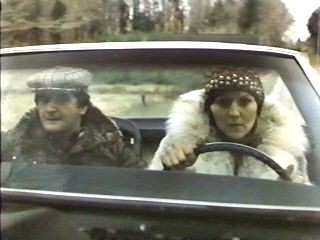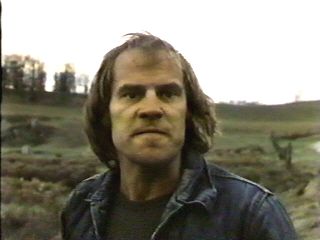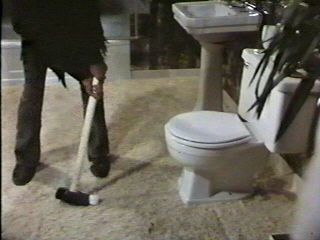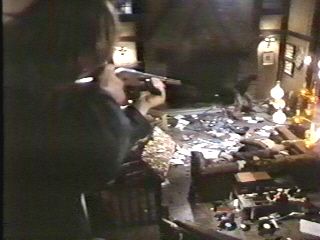
|
|
|
|
|
|
|
|
|
|
|
|
|
(a.k.a. The House By The Lake) (1976) Director: William
Fruet
When you look at books about Canadian cinema, you'll see
very little, if anything, about the years of work producer/director
Ivan Reitman did in his country before moving to Hollywood. One reason
is that the Obviously, Reitman acknowledged that audiences in general don't go to the movies to see art, they go to the movies to be entertained. Even though those snotty critics may go into paroxysms of fury over the idea that their fellow citizens would flock to see things like torture, murder, and various other acts of cruelty on the big screen, the box office has proved time and again that audiences do have some kind of a desire to see violence, like it or not. The fact that countries like France, Hong Kong, Korea, Japan, and others have also acknowledged what audiences want has resulted in these countries each having a healthy domestic film industry - unlike countries such as Brazil, Mexico, Belgium, and Canada, whose film industries concentrate on making "high art", despite the fact that their citizens constantly shun such movies. The movie of his that I am reviewing this week - Death Weekend - certainly does contain a good deal of material that could be considered entertaining to many people - it has a number of people dishing out various acts of cruelty to each other. Not only that, this cruelty is overall fairly well executed. Yet at the same time, the movie offers more than just slickly-executed mayhem. Though it's clear this movie was never intended to go beyond the drive-in market, you get a sense that the filmmakers were trying to give the audience more than an exercise to satisfy their base desires. Every so often, the movie gives you a little something - an idea, or maybe some professionalism in an area you don't usually associate with an exploitation movie - that, as the movie goes on, makes you realize that not only were the filmmakers trying to entertain, they were trying to give their audience something a little different for a change. It not only makes the movie entertaining outside of the scenes of mayhem, it even - dare I say it - makes us think a little. There is some genuine originality in Death Weekend,
though I'll admit that the central Though you can probably guess a lot of the stuff that happens once the four creeps reach the house, what's surprising is that though we do get the expected mayhem, it isn't presented in the way that we expect. Instead of Lep and his cronies immediately starting to whoop it up around the house and physically torture their prisoners, the first thing they do instead is... talk to Harry and Diane. And talk to them for a considerable amount of time before starting to have their fun. By itself this may sound boring and a kind of a letdown after having set things up to this point, but it actually isn't. What makes it work is that the aggressors are four unbelievably repellent antagonists. Though they came out of nowhere and that there is no explanation as to why they are so loathsome, their lack of development doesn't stop them from being extremely frightening. There is never an instance when even a little good can be seen in them, and even before they get to the house they have engaged in enough activity to show that nothing short of killing them could possibly stop their evil intentions. So when they stop and talk to Harry and Diane in their mocking and threatening manner, it's unbelievably tense. The four are so confident as well as menacing, it's sort of like prolonging the agony to come before it even actually starts. Stroud and the three other actors playing his partners in crime are so convincing in their roles, I can somewhat forgive that (except maybe for Stroud's character) none of these villainous characters have a personality that really makes them stand out as an individual from their buddies. They all play their chortling meanness with more or less the same note. Still, while all these characters play out the same, they at least share some interesting character traits. They center around the characters' extreme disrespect of women. A lot of people will spot that these men never once refer to a woman with a positive or even neutral description - the kindest they get is when they use the word "broad". What is both more subtle and interesting about their
viewpoint of women is that even though they are rampaging lunatics,
they all seem to share Another interesting character is Harry, with one of the most notable things about him is that despite the fact he's ostensibly one of the two protagonists in the movie, he actually isn't that sympathetic. He doesn't seem to think much of women, bragging to his buddies at a gas station about what he plans to be his latest conquest (we subsequently learn that he's been bringing up a different woman every weekend this summer), peeps at Diane through a one-way mirror while she's taking a shower, and is unsubtle when talking to her ("Do you pose in the nude?") He's also a deceiver, early on admitting to her that he's not a doctor but a dentist - and he had known for quite a while that Diane was thinking otherwise. Then having had Diane brought up to the cabin under the impression that there would be other people there, and when she finds out the truth and subsequently rejects his advances, he actually more or less blames her for "not understanding" his intentions. Besides a lust for women, his mind runs with a lust for power ("I like the biggest and best of everything"), which has run to such an extreme that he owns a carefully refurbished antique piano despite the fact he doesn't know how to play it. It gets even worse; when Lep and his cronies invade the house, Harry constantly tries to reason with them on his level ("I've given you money - what do you want!?"), and doesn't see that his method is utterly futile. This movie has some great character development, though
unfortunately it doesn't apply to every character. Possibly inspired by
the two dumb-dumb policemen Some people might also be put off by the fact that this
movie actually doesn't have as many juicy setpieces involving action
and horror than they might expect. It is true that there isn't as much
of this stuff as there is in other movies of this kind - in fact, the
nastiness here overall isn't as harsh as you'll find elsewhere. It's
then hard to understand why the censor board in the U.K. reportedly
still has this movie banned, despite much more violent movies having
escaped their condemnation in the past few years. Despite the violence
of the movie being somewhat softer than usual for the period, it still
manages to satisfy; the motorboat sequence is actually pretty
suspenseful and creepy, and there is a bit involving a piece of glass
that I'm sure will please many people. As well, these four creeps are
just so convincingly loathsome, that the chance of seeing them get
what's coming to them is automatically satisfying, even if there isn't
much blood or other stuff. It just goes to show that even in an
exploitation movie, the right kind of characters can go a long way,
including the fact that alone the characters in Death Weekend make
this movie worth a look. UPDATE: "Fenris" sent this along: "I read your review of Death Weekend
(a.k.a. The House By The Lake) UPDATE 2: "Bosch" sent in this correction: "Regarding Fruet's Death Weekend; it's
never been banned in the UK. The BBFC passed it with an X certificate
(minor cuts) in September 1976. It most certainly didn't feature on the
infamous VRA (Video Recording Act) List of "nasties" during the great
witchhunt of 1984. Thanks for the correction. I guess the writer of the article I read got confused due to the full-length version not being passed. Check for availability on Amazon (VHS) See also: Clownhouse, If I Die Before I Wake, Rituals |
 snotty critics that
write these books seem to think that a true Canadian movie must only
deal with subject matters like a turn of the century suicidal and
terminally ill Saskatchewan farmer having gay sex with a dead moose.
They seem to think that it's a sin if any Canadian movie is geared to a
mass audience, which is in fact what every Canadian movie Reitman ever
made was. In other words, he made - let's say it all together, folks -
real movies. Some examples include Foxy Lady, Ilsa -
Tigress Of Siberia, Cannibal Girls, and Blackout. What
is really embarrassing to these snotty critics - and what they talk
about even less than his Canadian career - is that while Reitman was in
Canada, his movies were pretty much the only Canadian movies making a
profit at the box office. In fact, even today his movies are still
about the only Canadian movies ever to make some kind of profit.
snotty critics that
write these books seem to think that a true Canadian movie must only
deal with subject matters like a turn of the century suicidal and
terminally ill Saskatchewan farmer having gay sex with a dead moose.
They seem to think that it's a sin if any Canadian movie is geared to a
mass audience, which is in fact what every Canadian movie Reitman ever
made was. In other words, he made - let's say it all together, folks -
real movies. Some examples include Foxy Lady, Ilsa -
Tigress Of Siberia, Cannibal Girls, and Blackout. What
is really embarrassing to these snotty critics - and what they talk
about even less than his Canadian career - is that while Reitman was in
Canada, his movies were pretty much the only Canadian movies making a
profit at the box office. In fact, even today his movies are still
about the only Canadian movies ever to make some kind of profit. story will have
elements that will be quite familiar to many viewers. It's obvious that
this movie was heavily influenced by Straw Dogs, with a
dash of Last House On The Left added in for good
measure. It begins in some isolated wilderness, where wealthy dentist
Harry (Shamata) is driving up to his fancy wilderness retreat for a
weekend romp, taking with him model Diane (Vaccaro) in the hope he can
do some of his romping with her. Not long after Diane gets a whim to
take the wheel of his Corvette for some of the journey, the two are
rudely harassed out of nowhere by a quartet of yahoos driving beside
them in another car. Diane isn't phased in the least, and actually
manages to force the other car off the road in a display of fancy
driving. The four men don't take kindly to this, especially their
leader Lep (Stroud), who vows to track the couple down so that they all
can take their revenge. When they do manage to find where Harry and
Diane are holed up... well, I think you have a pretty good idea of what
major events more or less subsequently happen, right up to the closing
credits. We've seen this basic plot many times before. I should point
out that although this movie has clearly been influenced by others, it
seems to have done some influencing of its own - among other things,
the lakeside setting, some motorboat action, and one of the goons (a
somewhat mentally handicapped fellow wearing glasses) being offered a
chance to have a woman at last all strongly suggest Meir Zarchi saw
this before making I Spit On Your Grave.
story will have
elements that will be quite familiar to many viewers. It's obvious that
this movie was heavily influenced by Straw Dogs, with a
dash of Last House On The Left added in for good
measure. It begins in some isolated wilderness, where wealthy dentist
Harry (Shamata) is driving up to his fancy wilderness retreat for a
weekend romp, taking with him model Diane (Vaccaro) in the hope he can
do some of his romping with her. Not long after Diane gets a whim to
take the wheel of his Corvette for some of the journey, the two are
rudely harassed out of nowhere by a quartet of yahoos driving beside
them in another car. Diane isn't phased in the least, and actually
manages to force the other car off the road in a display of fancy
driving. The four men don't take kindly to this, especially their
leader Lep (Stroud), who vows to track the couple down so that they all
can take their revenge. When they do manage to find where Harry and
Diane are holed up... well, I think you have a pretty good idea of what
major events more or less subsequently happen, right up to the closing
credits. We've seen this basic plot many times before. I should point
out that although this movie has clearly been influenced by others, it
seems to have done some influencing of its own - among other things,
the lakeside setting, some motorboat action, and one of the goons (a
somewhat mentally handicapped fellow wearing glasses) being offered a
chance to have a woman at last all strongly suggest Meir Zarchi saw
this before making I Spit On Your Grave. somewhat of a secret
fear of women. They seem to feel threatened by women, which is
hinted at early on when Lep comments after his accident, "That broad
can drive - that pisses me off!" Also interesting is that once they
reach the house, for the longest time they pretty much ignore Diane,
using almost all of their time to inflict agony on Harry. And when they
eventually try to do something sexual with Diane, they are not directly
involved; they tell Diane to give Harry oral sex in front of them.
Later (much later), Lep does finally try to have his way with Diane,
but it's only after she did something that really angered him and
threatened to loosen his hold on the situation. Then while Lep has her
on the floor ready to be dealt with, Diane makes an unexpected reaction
(which I won't reveal) that Lep wasn't prepared for, and in the few
seconds of silence that follow, the inner workings of the mind of Lep's
character is fully exposed, showing just what motivates him and makes
him feel powerful. I somewhat hesitate to label a sequence that could
alternately be labeled exploitive as "brilliant", but I can't deny the
effectiveness it has.
somewhat of a secret
fear of women. They seem to feel threatened by women, which is
hinted at early on when Lep comments after his accident, "That broad
can drive - that pisses me off!" Also interesting is that once they
reach the house, for the longest time they pretty much ignore Diane,
using almost all of their time to inflict agony on Harry. And when they
eventually try to do something sexual with Diane, they are not directly
involved; they tell Diane to give Harry oral sex in front of them.
Later (much later), Lep does finally try to have his way with Diane,
but it's only after she did something that really angered him and
threatened to loosen his hold on the situation. Then while Lep has her
on the floor ready to be dealt with, Diane makes an unexpected reaction
(which I won't reveal) that Lep wasn't prepared for, and in the few
seconds of silence that follow, the inner workings of the mind of Lep's
character is fully exposed, showing just what motivates him and makes
him feel powerful. I somewhat hesitate to label a sequence that could
alternately be labeled exploitive as "brilliant", but I can't deny the
effectiveness it has. in Last House
On The Left, there is a subplot here involving two dumb-dumb
gas station attendants. Getting drunk on some homemade hooch that Harry
gave to them, the movie cuts to their drunken shenanigans several
times, where they make complete idiots of themselves staggering around
and running their truck into their station. It's extremely annoying,
especially since their presence never once changes the status of
anything concerning the plot. This is not the only distraction that
temporarily dilutes the effect of the power generated by the rest of
the movie. It takes a long time to get a feeling that the movie is
taking place in a solid location; in the first fifteen minutes, every
location feels like it was shot very far from the others, with an
awkward mix of deep wilderness, commercial buildings, and public
campgrounds. The fact that the events in this movie are supposed to be
taking place in late summer but the fauna clearly was shot in a clearly
colder season just makes these locations even more convincing. And this
is yet another Canadian tax shelter movie which is supposed to be
taking place in the United States, yet we clearly see Canadian styles,
such as with the uniforms that the policemen wear.
in Last House
On The Left, there is a subplot here involving two dumb-dumb
gas station attendants. Getting drunk on some homemade hooch that Harry
gave to them, the movie cuts to their drunken shenanigans several
times, where they make complete idiots of themselves staggering around
and running their truck into their station. It's extremely annoying,
especially since their presence never once changes the status of
anything concerning the plot. This is not the only distraction that
temporarily dilutes the effect of the power generated by the rest of
the movie. It takes a long time to get a feeling that the movie is
taking place in a solid location; in the first fifteen minutes, every
location feels like it was shot very far from the others, with an
awkward mix of deep wilderness, commercial buildings, and public
campgrounds. The fact that the events in this movie are supposed to be
taking place in late summer but the fauna clearly was shot in a clearly
colder season just makes these locations even more convincing. And this
is yet another Canadian tax shelter movie which is supposed to be
taking place in the United States, yet we clearly see Canadian styles,
such as with the uniforms that the policemen wear.